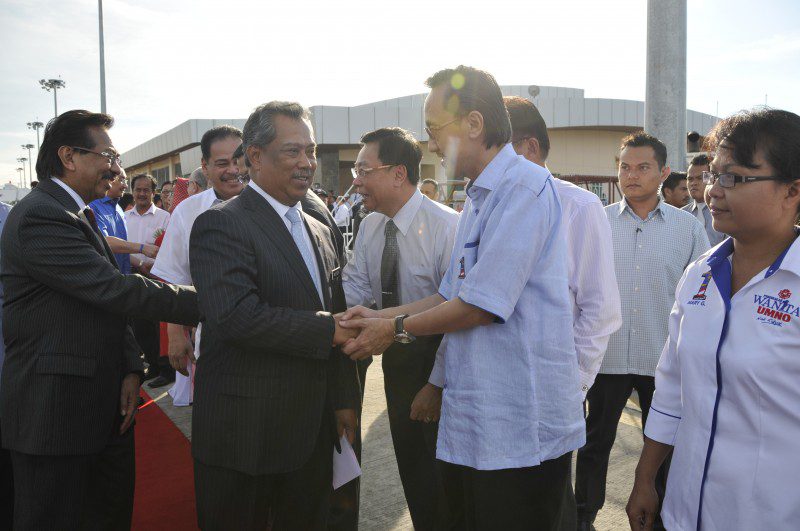Rhino breeding facility urgently needed
There is now an urgent need to establish the Borneo Rhino Sanctuary (BRS) breeding facility. The facility, expected to cost around RM8 million is needed badly, and while the government has agreed to its establishment in 2008, it has not been built yet, Borneo Rhino Alliance (BORA) Executive Director Datuk Dr Junaidi Payne said this to reporters visiting the interim facility on Thursday.
“I hope the capture of Puntung would prompt the government of Malaysia with renewed interest because we are in need of this proper long term breeding facility,” said Payne.
Puntung is a young Sumatran rhino that was captured on December 18, 2011, within the reserve itself and was moved to the interim facility next to the sole male rhino in captive, Tam, on Dec 25, last year.
“A tentative estimate of her age is 10 to 12 years old. She is feeding well and putting on weight,” he said.
Payne added that the capture of Puntung haD raised their hopes for survival of the species.
“What I can say at this stage is that we have a potentially fertile male, Tam, and a potentially fertile female, Puntung. So we are now presented with a potential that wasn’t there before, several years ago. If nothing else, it gives us something like the confidence element, not only for BORA but also the government, and that is something worth pursuing,” said Payne.
Without the facilities established, mating for Puntung and the sole male captive rhino on site, Tam, would have to take place in a small paddock between the night stall and the forest paddock, which Payne described, as tiny and not ideal.
“It is about 18 by 20 meters,” he said.
He explained that the ideal mating facility for the rhinos would be a bigger area so that they can run around, and with trees so that the female can hide if the male gets too aggressive.
The area would also be preferably flat so there is no risk for the rhinos to fall down into gullies, said Payne.
“But we don’t have this at this site now.”
Young Sumatran rhino males are particularly aggressive with females, often injuring them during the courtship.
“Having to continue to depend on temporary facilities financed by the Yayasan Sime Darby and WWF Germany, instead of having the long-term breeding facility as planned, is hampering the smooth running of the programme,” he said.
Even though there is no guarantee that the programme would work, Payne said that based on past lessons/experiences by other establishments such as the Cincinnati Zoo, excellent health care and a good diet should help to improve chances of success.
“We are not sure it will work…but I want to add that Cincinnati Zoo has been successful in its captive rhinos breeding programme and has produced three babies, the oldest of which has been sent back to Indonesia and is now a breeding bull in Indonesia.”
He added that Sabah will not emulate the Cincinnati experience and planned to keep the situation as natural as possible for the rhinos here.
“The more natural, the better.”
There are probably less than 150 Sumatran rhinos surviving in Sumatra (Indonesia) and less than 40 in Borneo, most of which are in Sabah.
But in reality, their plight is even worse that this number indicates, said Payne.
“On Borneo, possibly only five or so breeding female rhinos remain in existence, probably all in Sabah,” he said.
He added that the numbers of rhinos are so low, and their forest habitat is so dense, that it is not possible to get a reliable estimate of exactly how many remain, but steadily decreasing signs of rhinos over the past 40 years show that their numbers continue to decline, despite the existence of protected forest areas such as the Tabin Wildlife Reserve.
“Sumatran rhinos are so rare that loss of the rainforest habitat is no longer a threat to their survival – there is plenty of rhino habitat with no rhinos. Oil palm plantations do not pose a threat to the species.”
The threat to the species is their extremely low numbers, the probability that most wild rhinos are old and infertile and their inadequate breeding rate to sustain their survival, he said.
Payne opined that the species got so endangered due to a combination over the past millennium of loss of most of their prime habitat in the lowlands of Southeast Asia and chronic hunting for their horn, used in traditional Chinese medicine.
He believed that it is worth saving the species from extinction because it is already known that with specific actions, the species might still be saved.
He also said that the opportunity to save the species is still available now, but opined that the chance will be lost within a decade or so from now.
He said that among the things that need to be done now and for the future to prevent the extinction of the species are the prevention of any killings or trappings of the rhinos and to bring them together to increase the chances of breeding.
In a nutshell, the BRS is a programme of the Sabah Government, located in Tabin Wildlife Reserve, which commenced in 2009 and which aims to prevent the extinction of the Sumatran rhinos, particularly through increasing the number of rhino births.
The sanctuary will be developed on a 20-hectare site of fenced, managed facilities at the reserve.
To date, core funding for development and operation of the BRS programme has come primarily from the Sime Darby Foundation with a substantial commitment of RM5 million for three years from 2009 to 2012.
As of January 2012, the foundation has spent almost RM3.5 million on the programme. Other assistance is from the federal and State governments with extra help from WWF-Germany.
Payne also suggested that anyone can help in sustaining the species by supporting the concept of the BRS programme.
“Owners, shareholders, managers and staff of plantations adjacent to forests where rhinos occur have an important role to play in maximizing security against unauthorised entry of people to the forest edge, and ensuring that their own workers and contract workers do not hunt or set traps in the forest.
This is vital – both Puntung and Tam have their feet damaged due to snare traps set in the forest. Probably other rhinos have died from wounds and infection caused by snare traps,” he said.
Meanwhile, the Sumatran rhinos is the smallest of the world’s five rhino species, weighing between 500 and 600 kilograms, up to 1.3 meters tall with two horns and thick, brown hairy skin.
It is amongst the most endangered species in the world, and needs urgent and sustained action to prevent its extinction.
It is listed as a totally protected species under the Sabah Wildlife Conservation Enactment 1997.
The penalty for killing a Sumatran rhino in Sabah is a mandatory jail sentence of not less than six months and not more than five years, while unlicensed possession of any rhino part is subject to a fine of RM50,000 or jail of up to five years or both.
This rhino is the last remnant of an evolutionary line of hairy rhinos which started to evolve some 20 million years ago.
“It is a solitary animal that feeds mainly on rainforest leaves and spends the hot hours of the day bathing in mud wallows. And apart from one female in Cincinnati Zoo, all known breeding female rhinos of this species exist only on the islands of Sumatra and Borneo,” said Payne.
Source: Borneo Post (by Jenne Lajiun)



 YB Datuk Masidi Manjun menyambut ketibaan YAB Tan Sri Dato' Hj Muhyiddin Bin Mohd Yassin Timbalan Perdana Menteri Malaysia merangkap Menteri Pelajaran Malaysia di Lapangan Terbang Antarabangsa Kota Kinabalu Terminal 2 , yang membuat lawatan kerja 2 hari Ke Sabah bermula dari 16-17 Januari 2012. Turut kelihatan dalam gambar adalah YAB Datuk Seri Panglima Musa Haji Aman, Ketua Menteri Sabah.
YB Datuk Masidi Manjun welcomes the arrival of YAB Tan Sri Dato' Hj Muhyiddin Bin Mohd Yassin, Deputy Prime Minister of Malaysia cum Minister of Education, at Terminal 2, Kota Kinabalu International Airport. The Deputy Prime Minister was on an official 2-day visit to Sabah from the 16th to the 17th of January 2012. Also seen here is YAB Datuk Seri Panglima Musa Haji Aman, Chief Minister of Sabah.
YB Datuk Masidi Manjun menyambut ketibaan YAB Tan Sri Dato' Hj Muhyiddin Bin Mohd Yassin Timbalan Perdana Menteri Malaysia merangkap Menteri Pelajaran Malaysia di Lapangan Terbang Antarabangsa Kota Kinabalu Terminal 2 , yang membuat lawatan kerja 2 hari Ke Sabah bermula dari 16-17 Januari 2012. Turut kelihatan dalam gambar adalah YAB Datuk Seri Panglima Musa Haji Aman, Ketua Menteri Sabah.
YB Datuk Masidi Manjun welcomes the arrival of YAB Tan Sri Dato' Hj Muhyiddin Bin Mohd Yassin, Deputy Prime Minister of Malaysia cum Minister of Education, at Terminal 2, Kota Kinabalu International Airport. The Deputy Prime Minister was on an official 2-day visit to Sabah from the 16th to the 17th of January 2012. Also seen here is YAB Datuk Seri Panglima Musa Haji Aman, Chief Minister of Sabah. YB Datuk Masidi Manjun menerima kunjungan hormat daripada penganjur Borneo Eco Film Festival (BEFF) pada 17 januari 2012 bertempat di pejabat menteri.
YB Datuk Masidi Manjun receives a courtesy visit from the organizers of the Borneo Eco Film Festival (BEFF) on 17th January 2012 at his office.
YB Datuk Masidi Manjun menerima kunjungan hormat daripada penganjur Borneo Eco Film Festival (BEFF) pada 17 januari 2012 bertempat di pejabat menteri.
YB Datuk Masidi Manjun receives a courtesy visit from the organizers of the Borneo Eco Film Festival (BEFF) on 17th January 2012 at his office.